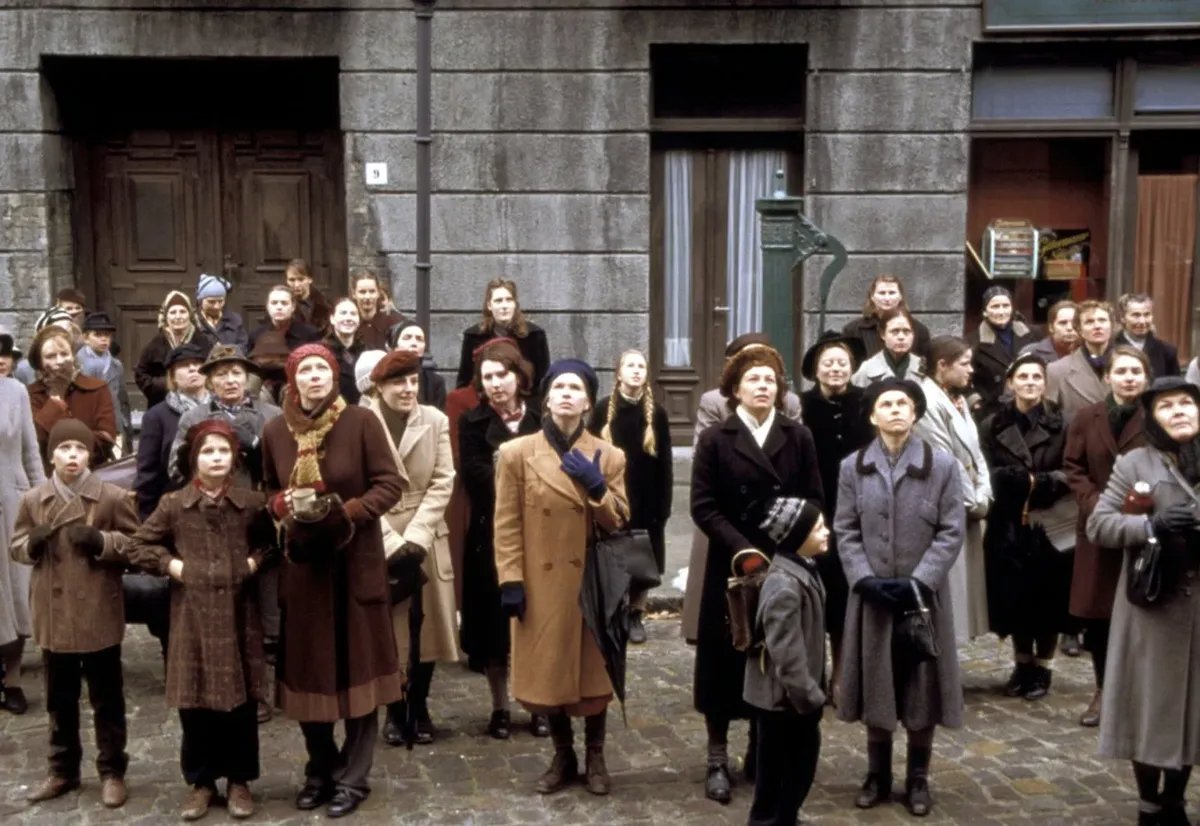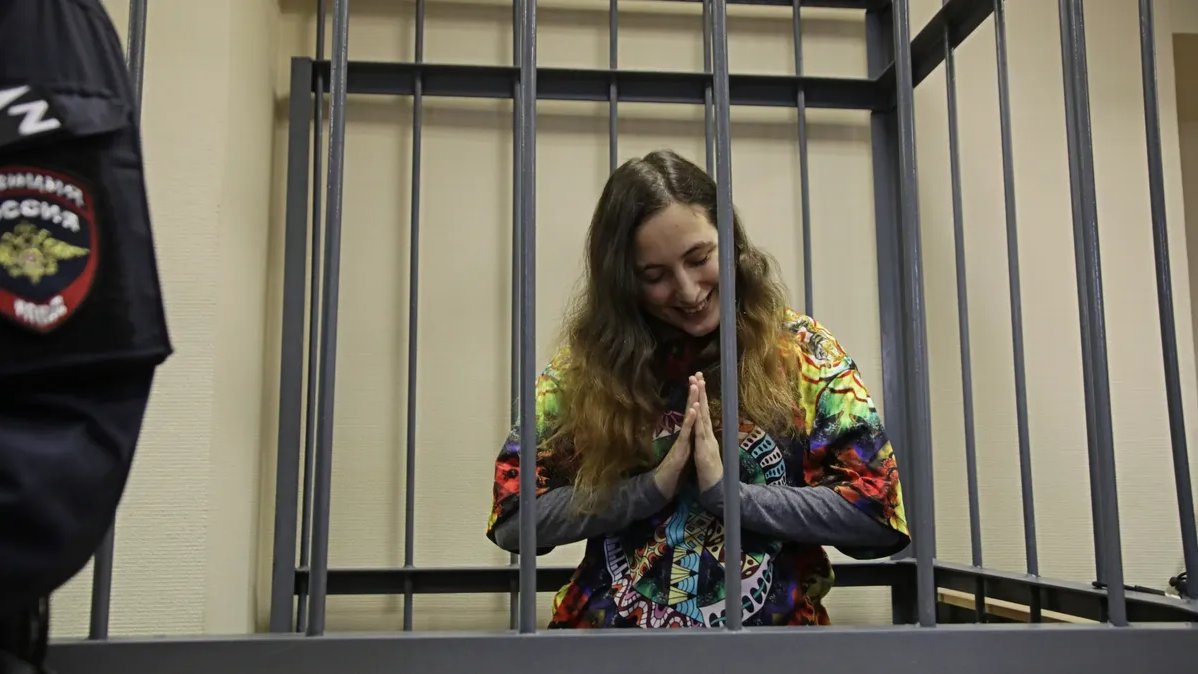On the day Sasha Skochilenko was sentenced to seven years in jail for her anti-war protest, the war continued: soldiers from both sides died in battle, Russia bombed peaceful cities, killing and maiming civilians. So what’s seven years, you might think. At least she wasn’t shot.
But Sasha’s sentence also counts as news from the front. The war, which began life as a “special military operation”, and was meant to remain on the periphery of public life right up until the promised victory parade in Kyiv, has proven to be an all-consuming beast.
I probably shouldn’t comment on the gender of someone in the news, but I can’t help it: misanthropic statements made by women shock me more than equally disgusting statements by men. And the achievements and dedication of women enchant me more than the heroism of men, so when women become the victims of this stupid and evil system, it provokes a much greater emotional response in me.
It just so happens that, in addition to the crazy Skochilenko story, much has happened in recent days concerning women or women’s issues. The state has its eye on abortion again. Crimean senator Olga Kovitidi proposed making “inducement to abortion” an offence — virtually anything can be considered inducement, of course. According to the authorities, abortion should be banned on moral, religious and demographic grounds.
Russia’s birth rate continues to fall, and natural population decline — mortality exceeding birth rates — is still growing.
Kovitidi’s fellow senator Margarita Pavlova, who calls abortion murder — during a war — and a threat to national security, speaks of the need to redirect young women from education to childbirth. Don’t study. Have babies.
That abortion bans lead to an increase in crime and social inequality and are certainly never a solution to demographic problems may be well established, but for lawmakers this issue is less about prohibiting abortion than it is about asserting their power.
“My body, my choice!” doesn’t apply in Russia, in fact, it’s tantamount to an extremist slogan! That’s because in Russia individuals themselves belong to the state. According to this ideology, overt demonstrations of free will such as terminating a pregnancy are unacceptable. It’s why fascists everywhere are so deeply opposed to any talk of bodily autonomy, and offer up talk of demographics as a smoke screen.
A fascist dictatorship clearly defines purpose: men should fight and, preferably, die for the Motherland, while women should give birth to the fighters of tomorrow, take care of the home so that soldiers have somewhere to return to while they’re still alive, and admire the exploits of men.
However, rigid enforcement of gender roles sometimes creates trouble for the dictatorial state itself. What happens when women come into conflict with the authorities in the course of fulfilling this duty?
When, in March 1943, German women in Berlin demanded the release of their Jewish husbands — the demonstration on Rosenstrasse lasted a week — the Nazis backed down and the men were set free. Joseph Goebbels, the Minister of Propaganda, personally gave the order for the prisoners to be released. Hitler’s mob weren’t famed for their excess humanism (much like our current powers-that-be), but they clearly had no appetite to disperse or repress German women speaking out in defence of their families.

Still from the film Rosenstrasse
Vladimir Vladimirovich now has a similar situation on his hands: the wives and mothers of mobilised soldiers turning out on Red Square. They were not protesting against the war (the women on Rosenstrasse didn’t comment on anti-Semitic policies either). All they were asking is that their men come home — which they won’t ever do as long as the authorities say the mobilised will remain at the front until victory.
But the Russian authorities have turned out to be tougher than even the Nazis, simply banning all future protests citing fears of COVID transmission! At the same time, they also began a campaign of intimidation aimed at the protestors. Sit down and shut up or things will get even worse for your husbands. It seems to have worked. And, society, as always, remains indifferent.
Once upon a time, war was a matter between men, even many blood feuds forbade the killing of women. Our authorities have overcome such prejudices and will now put anyone in jail, regardless of sex. Indeed, many women have been there for some time and more will doubtless be joining them soon. Alsu Kurmasheva, a journalist with Radio Free Europe/Radio Liberty, was recently detained for failing to declare her dual nationality, or report herself as a foreign agent.
But even so, the Skochilenko case stands out. She replaced five price tags in a supermarket with five anti-war messages — and got seven years! There were no victims, and we would never have heard a thing about her tiny act of protest were it not for the criminal investigation and court case.
There are three women involved.
First, the 76 year-old informant, who was outraged and called the police. She gave an interview to St. Petersburg website Paper, in which she said she had no regrets and couldn’t understand why people called her a snitch. Shout out to Pavlova. If she hadn’t been able to read, she wouldn’t have got so wound up and called the police. The harm education does! But it isn’t the fact she called the police that stands out so much as the fact that she doesn’t support Putin! The only good thing he’s done, she said, was retaking Crimea. Skochilenko’s guilt was only underlined in her eyes by the fact that the people who came to support her in court weren’t even Russian! Fascism extends far beyond Putin supporters.
Second, the judge, Oksana Demyasheva. She may not look like the SS women depicted in Soviet films, but she’d give any one of them a run for their money. She has never acquitted anyone in her entire career. But it is unlikely that she had orders to torture Skochilenko: to prevent her receiving medications or replacing the battery in her pacemaker, forbidding her to see doctors (as she is seriously ill — a letter from multiple doctors was provided in her defence, and has now been signed by dozens of specialists). Not allowing food and water to be brought into court — Skochilenko was often taken to court before breakfast and returned after dinner and so didn’t eat for days. Nor was she allowed to go to the toilet! I think Her Honour did it just for fun. A government reliant on lowlifes has no reason to shy away from sadists.
And, finally, Skochilenko herself. When she changed those price tags, she probably didn’t expect such a nightmare: a year and a half in pre-trial detention, victimisation, prison. Yet she has shown remarkable resilience, and the speech she gave at her trial is, in my view, the best of the many delivered recently. I hope it will find its rightful place in the compendium of speeches in the courts of Putin’s Russia. She is no longer just a victim of the cruelty of this criminal government — she is a heroine.
Even if you know nothing about the war, the torture, the thievery, the Skochilenko case is all you need to know to make out the true face of Vladimir Putin’s regime.
Join us in rebuilding Novaya Gazeta Europe
The Russian government has banned independent media. We were forced to leave our country in order to keep doing our job, telling our readers about what is going on Russia, Ukraine and Europe.
We will continue fighting against warfare and dictatorship. We believe that freedom of speech is the most efficient antidote against tyranny. Support us financially to help us fight for peace and freedom.
By clicking the Support button, you agree to the processing of your personal data.
To cancel a regular donation, please write to [email protected]

